- Home
- Robert B. Parker
Now and Then s-35 Page 8
Now and Then s-35 Read online
Page 8
“You knew who Alderson was before I ever came to see you,”
I said.
“He was a person of interest,” Epstein said. “But pretty low priority.”
“And his organization,” I said.
Epstein shrugged.
“Like you told us everything,” he said.
“You started it,” I said.
Epstein grinned.
“You got a plan?” he said.
“I want to bring him down,” I said. “For the murders.”
“And your FBI? He killed one of my agents. You want me to stand around and reload for you?”
“You get him for subversion or whatever you were looking at him for in the fi rst place,” I said.
“And if we overlap?”
“We’ll adjust,” I said.
“A race?” Epstein said.
“First one to bust him wins?” I said.
“He gets busted everybody wins,” Epstein said. “I don’t care who gets the credit.”
“J. Edgar must be doing ring-around-the-rosy in his grave,”
I said.
28.
And he didn’t ask who shot the mystery assassin?”
Susan said.
“No.”
“Well, that’s some sort of vote of confidence, isn’t it,” she said.
“He knows I wouldn’t tell him.”
“And he wants your help,” Susan said.
“I can do things that are illegal for him.”
“And you,” she said.
“Sometimes,” I said.
“But he can do things you can’t,” Susan said.
“He has resources I lack.”
“So you avoid the minefields,” Susan said. “And you both know that you’re doing it, and you know why, and you don’t say anything.”
“We both want the guy that killed Doherty,” I said. We were at my place, I was making supper. She was at my kitchen counter, on the living room side. Pearl had claimed the couch, which she managed to occupy more fully than one would think possible for a seventy-fi ve-pound dog.
“It’s about Doherty,” Susan said.
“Man was murdered,” I said.
“His wife was murdered too,” Susan said.
I mixed bread crumbs and pignolia nuts with a little olive oil, and began to toast them in a fry pan on low.
“Doherty was one of Epstein’s,” I said. “Makes it kind of personal.”
“And you?” Susan said.
“Guy’s going along doing his job, living his life, and his wife takes up with another guy, and it breaks his heart, and then gets him killed,” I said. “That needs to be evened off a little.”
I took the fry pan off the fire and emptied the toasted crumbs and pignolias into a bowl. I had a large pot of water boiling on the stove. I put some whole-wheat linguine in it and set my timer.
“But she doesn’t need evening off? Because she caused the trouble in the fi rst place.”
“Alderson’s responsible for both,” I said. “We get him, we even everything off.”
“You don’t hold her responsible?”
“I don’t know enough,” I said. “Maybe Doherty drove her to it.”
Susan nodded. She was sipping a glass of sauvignon blanc.
“Happens,” she said.
After the pasta had cooked for three minutes I added slices of yellow squash and zucchini.
“You think I’m overidentifying with Doherty because of what happened to us all that time ago?” I said.
Susan smiled.
“Happens,” she said.
“It didn’t get me killed,” I said.
“But people died,” Susan said.
I nodded. I had a tall scotch and soda working and I drank some of it.
“Hawk thinks I’m identifying.”
“He’s spoken of it?”
“Not really,” I said. “But it’s what he thinks.”
“And he’s probably worried about it for the same reason I am,” Susan said.
“Which is?”
“That you don’t have enough distance on it,” Susan said.
“And it will get you killed.”
“What I do entails a certain amount of that,” I said. “We both know it. And we both move on. Nobody’s killed me yet.”
“You’ve set yourself up with Alderson,” Susan said.
“He won’t try to kill me. He doesn’t know where the tape is.”
“If he doesn’t do something,” Susan said, “your trap won’t work.”
“He’ll do something,” I said.
“What?”
“I don’t know. When I boxed I was a counterpunch.”
“So readiness is all,” Susan said.
“Yes.”
We were quiet for a moment.
“He might try to use you as leverage on me,” I said.
“I need to do my work,” Susan said. “I can’t go somewhere and hide.”
“We’ll protect you,” I said.
“I know.”
“Hawk mostly,” I said. “I don’t want to draw them to you.”
“Hawk will do,” she said.
“He often does,” I said. “I’m sorry this impinges on you.”
She smiled at me.
“It’s happened before,” she said. “Goes with the job description.”
“Which is?”
“Main Squeeze,” she said. “And what about the matter of identifying with Doherty?”
The timer sounded. I poured the pasta and vegetables into a colander and let them drain for a moment.
“I know about the time you were with another man,” I said.
“And I know we’re together now.”
Susan nodded.
I put the pasta and vegetables in a bowl, added the toasted crumbs, pignolias, and some grated cheese. I tossed it all with a splash of olive oil. Susan watched me silently. I stopped tossing the pasta and put the spoons down and looked at her. She put her hand on top of mine where it rested on the counter.
“That’s all I need to know,” I said.
29.
He gonna find out who you are,” Hawk said, “by now.”
“Probably,” I said.
“So he gonna fi gure out that you might be baiting him.”
“But he can’t be sure. Not all of us are equally honest,” I said.
“He might fi nd out that you are,” Hawk said.
“Either way,” I said, “he’s going to have to do something.”
“He could disappear,” Hawk said. “Start over someplace else. New identity. Not so hard to do, you know a couple people.”
“Feds are all over him,” I said. “I doubt that he’ll disappear.”
“Feds ain’t that good,” Hawk said.
“Epstein is,” I said. “And this is one of their own.”
Hawk shrugged. We were in his car, parked on Linnaean Street across from Susan’s home.
“You afraid he’ll make a run at Susan?” Hawk said.
“If he’s learned enough he’ll know it’s the only thing he can blackmail me back with. He can’t come straight at me because he doesn’t know where the tape is.”
“You thinking ’bout reinforcements?” Hawk said. “Me and Vinnie gonna get spread pretty thin covering you ass and hers.”
“I’ve made some calls,” I said. “Until we get more feedback we’ll all cover Susan’s ass . . . so to speak.”
“Lot better-looking than yours,” Hawk said.
“I don’t know,” I said.
“Yeah, you do,” Hawk said.
A bald guy, maybe forty-five, in a black jacket and a blue shirt, came out of Susan’s front door and down the steps. I looked at my watch.
“Okay,” I said. “Fifty minutes, right on schedule.”
Five minutes later a young woman went up the stairs. She had on a gray jacket, unzipped, with a maroon sweater that ended four inches above her low-rider jeans.
“What you suppose her p
roblem is?” Hawk said.
“Compulsive belly fl asher,” I said.
“Lotta that happening ’round here,” Hawk said. “You call Tedy Sapp?”
“I did.”
“Chollo?”
“Yep.”
“And?”
“Sapp’s out of the country. I talked to Mr. Del Rio. He said he could lend me either Chollo or Bobby Horse, but not both.”
“Chollo,” Hawk said.
“That’s what I told him,” I said.
“How ’bout the little dude from Vegas?” Hawk said.
“Bernard J. Fortunato,” I said. “Couldn’t locate him.”
“Last time he helped us out, he got shot up,” Hawk said.
“I know,” I said. “Probably deserves a bye on this one.”
“We got enough people anyway,” Hawk said. “Hell, Chollo come aboard, and we got them outnumbered.”
“You know it’s not your fi ght,” I said.
“Ain’t Vinnie’s fi ght,” Hawk said, “or Chollo’s either.”
“That’s right,” I said.
Hawk smiled.
“Any fi ght will do,” he said.
30.
Alderson came in with a big red-haired guy who looked like a tough hippie. Flannel shirt, work boots, beard. Halfway to the desk, Alderson stopped and stared at Chollo sitting on the couch.
“Who’s this?” Alderson said.
“My friend,” I said, “visiting from Los Angeles.”
Chollo was slender and medium height, with a ponytail. He looked with quiet amusement at the big red-haired guy.
“Why is he here?” Alderson said.
I pointed my chin at the big redhead.
“Protect me from the red menace,” I said.
“Him?” the redhead said.
“Sí,” Chollo said.
“Oh, I’m scared,” the redhead said.
“May I talk freely?” Alderson said.
“Absolutely,” I said.
The redhead kept eyeing Chollo. Chollo paid him no further attention. In fact he seemed as if he might be about to nod off.
“I have your money,” Alderson said.
“Good,” I said. “I have your tape.”
“Will this be the end of it?” Alderson said.
“You mean have I made a bunch of dupes,” I said. “And is this the fi rst of many payments?”
“Yes.”
“I’ve kept a backup to protect myself,” I said. “But I won’t ask for more money.”
“Not acceptable,” Alderson said.
“Does this mean you’re not going to give me the fifty large?”
I said.
“Not unless I get everything,” Alderson said.
“Okay,” I said.
“Okay?”
“Give me the fi fty, you get everything.”
“How do I know I can trust you?” Alderson said.
“I’m paralyzed with fear of Big Red?”
“Mr. Spenser,” Alderson said. “I do not respond well to frivolity.”
“What a shame,” I said.
“I will not be treated like this,” Alderson said. “I will not pay you any money.”
“And the tapes?” I said.
“There are many ways to get them,” Alderson said. “Please remember that I attempted the most civilized way fi rst.”
“How could I forget,” I said.
“This,” Alderson said, “is not a whimsical matter.”
“What kind of matter is it?” I said.
Big Red was eyeing Chollo as we talked. Red looked scornful. Chollo appeared to be thinking long thoughts about pleasant things.
“This government will use any means to silence me,” Alderson said. “The tapes would give them a pretext.”
“You don’t even know what’s on the tape,” I said. “Except for the excerpt I played. What do you think they’ll hear when they play it.”
“You won’t give the tape to them,” Alderson said. “You will lose any chance at fifty thousand dollars and any other leverage with me that you might need.”
“What other kind might I need?” I said.
“I will have those tapes one way or another,” Alderson said. Alderson turned on his heel and headed for the door. Big Red followed him. He stopped at the door and gave Chollo a long last look.
“Maybe I’ll see you again,” he said.
Chollo raised his head slightly and looked at Big Red through his half-closed eyes. Alderson was already in the hall.
“Ay caramba,” Chollo said.
Big Red went out without shutting the door behind him. Unmannerly.
“Well,” I said. “That went well.”
Chollo smiled.
“I’m here to protect you from that?” Chollo said.
“Give them a chance,” I said.
“Why don’t I go back to LA and send my little sister out?”
“They’ve killed a couple of people,” I said. “One of them FBI.”
“Anybody can kill anybody,” Chollo said. “These people are amateurs.”
I nodded.
“I know you won’t go for it,” Chollo said. “But I could spike both of them and be kicking back in Boyle Heights tomorrow.”
“When’s the last time you were in Boyle Heights?” I said.
“Kicking back?”
Chollo grinned.
“1991,” he said. “Been there since, but not kicking back.”
“On business?” I said.
“For Mr. Del Rio,” Chollo said. “How ’bout Hawk and Vinnie, they in this?”
“They’re with Susan,” I said.
“And I get you,” Chollo said.
“Somebody had to,” I said.
“So Alderson thinks there’s a stalemate,” Chollo said. “He’s got your money and you’ve got his tapes and neither one of you can make a move without you losing the money or him losing the tapes.”
“Yes,” I said.
“So we sit around and await developments?” Chollo said.
“Maybe we’ll snoop a little,” I said.
31.
My phone rang. It was Epstein.
“Alderson came to see you,” he said.
“I told him I had the incriminating tapes, beyond what he got from Doherty’s house.”
“And?” Epstein said.
“I offered to sell them to him for fi fty thousand. He came to negotiate.”
“Who’s the big red-haired guy?” Epstein said.
“Don’t know,” I said. “You photograph him?”
“Of course we photographed him,” Epstein said. “We’ll run him through the system.”
“Show him to Belson, too,” I said. “He remembers people that aren’t in the system.”
“You get the money?”
“No,” I said. “I don’t think he ever planned to pay it. He was just trying to get the lay of the land.”
“You got some backup?”
“An adorable little Latin person,” I said.
Chollo was drinking coffee.
“I’m not so little,” he said.
“Well, I assume you hire good help,” Epstein said.
“The best,” I said.
Chollo nodded.
“He won’t take a run at you until he knows where the tapes are,” Epstein said.
“And he thinks I won’t give you the tapes until I get my fifty thousand.”
“A Mexican standoff,” Epstein said.
“Sí.”
Chollo said, “You speak my language.”
I grinned at him.
“Somebody talking to you?” Epstein said on the phone.
“My bodyguard,” I said. “He likes to practice his English.”
“Me too,” Epstein said. “You think he’s going to try for leverage on you?”
“Once he’s sure greed won’t do it,” I said.
“You got Susan covered,” Epstein said.
“Yes.”
“Hawk?” E
pstein said.
“Yes,” I said. “And Vinnie Morris.”
“Don’t recall Morris,” Epstein said.
“He’ll do,” I said.
“So you don’t need anything from me on that front.”
“No.”
“Well, stay on that,” Epstein said. “Anyone who does any looking around knows that she’s the breach in your wall.”
“True,” I said. “But she’s also the wall.”
“Whatever that means,” Epstein said. “What now?”
“We’ll see,” I said.
32.
T he neighborhood on Magazine Street, where Lyndon Holt lived with Sheila Schwartz, reeked of graduate student. The gray clapboard apartment building had once been a large single residence. The Holt/Schwartz apartment was a second-floor walk-up that overlooked somebody’s two-car garage.
I rang the bell and waited. In a moment a woman’s voice said, “Who is it?” over the intercom.
“Spenser,” I said. “I called, from Arsenal magazine? I’m here with my photographer.”
“Oh sure,” the voice said. “Top of the stairs.”
“Arsenal?” Chollo said.
I shrugged.
The intercom buzzed. I heard the door lock click and opened it. Chollo and I went into the little hallway and up the stairs. Chollo was wearing a camel-hair overcoat and carrying a camera bag over his shoulder. Sheila was standing in the open doorway. Low jeans, short T-shirt, showing a lot of stomach. If she was going to dress like that, I thought, she ought to do a lot of situps. Lyndon stood behind her in the doorway. The full slacker: white T-shirt, multi-striped dress shirt, unbuttoned with the shirttails out. Jeans, hiking boots. Everything but the boots had obviously been home-laundered.
“Sheila says you’re doing a piece on Perry?” Lyndon said.
“Yes,” I said. “We thought it would make an interesting story the way events in the Middle East have, so to speak, reinvigorated the remnants of the counterculture.”
“Remnants?” Lyndon said.
“The opposition had lowered its voice for a while there after Vietnam.”
“They’d like you to think that,” he said.
“Would you folks like some coffee?” Sheila said.
“That would be swell,” I said. “You don’t mind if my photographer takes some shots? You know, ambience shots, maybe some candids of you folks.”
“No, that’s fi ne,” she said. “You don’t mind, do you, Lyn?”
“I want to see the story before it’s published,” Lyndon said.

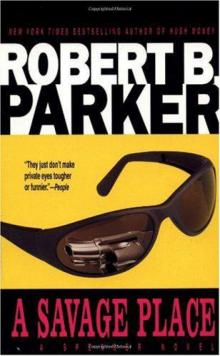 A Savage Place s-8
A Savage Place s-8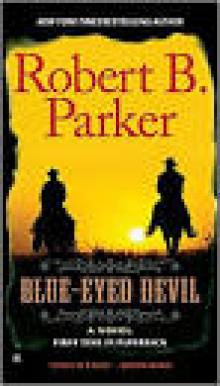 Appaloosa / Resolution / Brimstone / Blue-Eyed Devil
Appaloosa / Resolution / Brimstone / Blue-Eyed Devil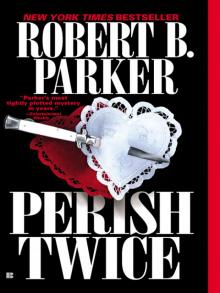 Perish Twice
Perish Twice Spare Change
Spare Change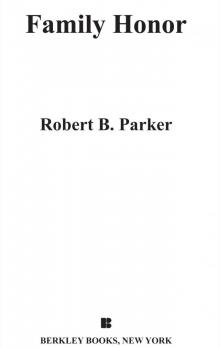 Family Honor
Family Honor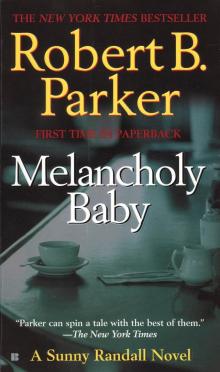 Melancholy Baby
Melancholy Baby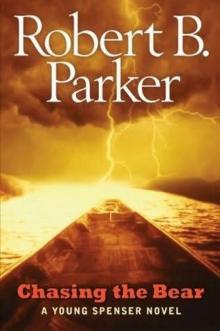 Chasing the Bear
Chasing the Bear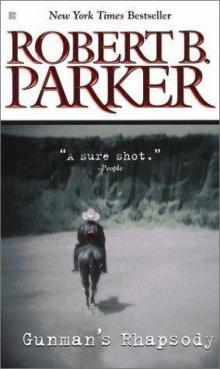 Gunman's Rhapsody
Gunman's Rhapsody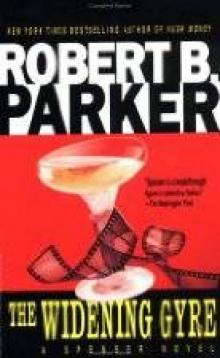 The Widening Gyre
The Widening Gyre Thin Air
Thin Air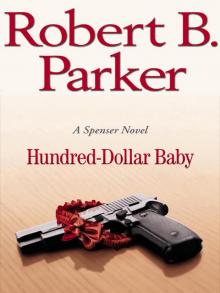 Hundred-Dollar Baby
Hundred-Dollar Baby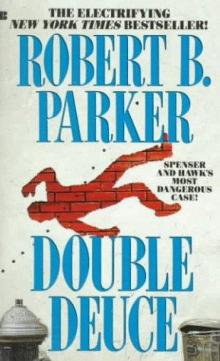 Double Deuce s-19
Double Deuce s-19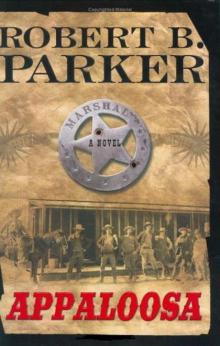 Appaloosa vcaeh-1
Appaloosa vcaeh-1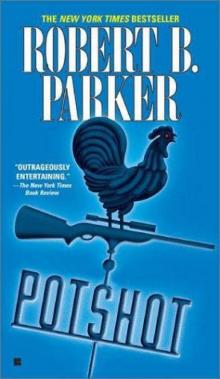 Potshot
Potshot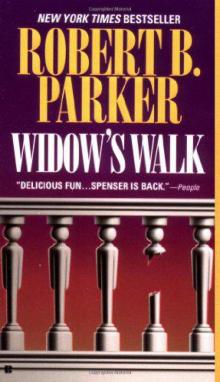 Widow’s Walk s-29
Widow’s Walk s-29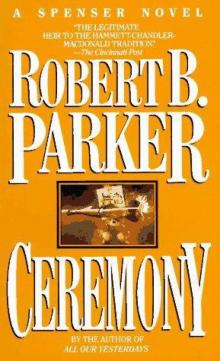 Ceremony s-9
Ceremony s-9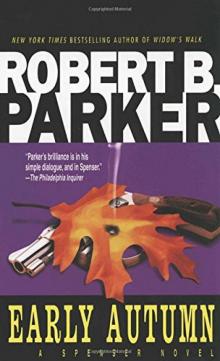 Early Autumn
Early Autumn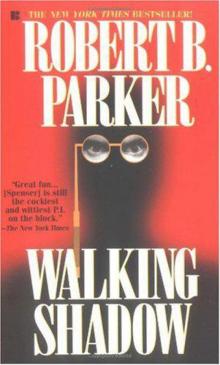 Walking Shadow s-21
Walking Shadow s-21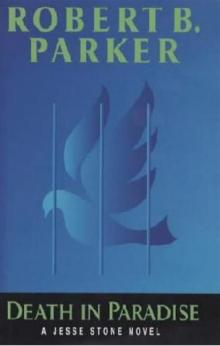 Death In Paradise js-3
Death In Paradise js-3 Shrink Rap
Shrink Rap Blue-Eyed Devil
Blue-Eyed Devil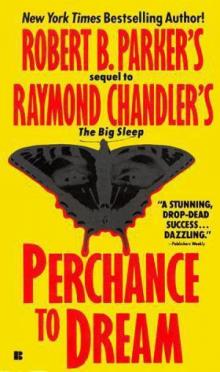 Perchance to Dream
Perchance to Dream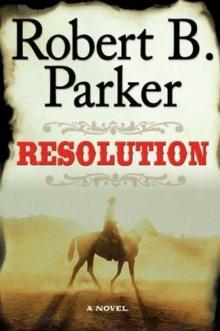 Resolution vcaeh-2
Resolution vcaeh-2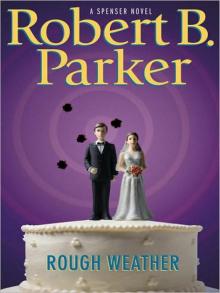 Rough Weather
Rough Weather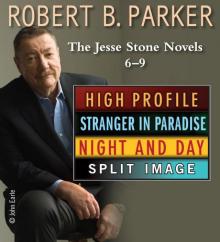 The Jesse Stone Novels 6-9
The Jesse Stone Novels 6-9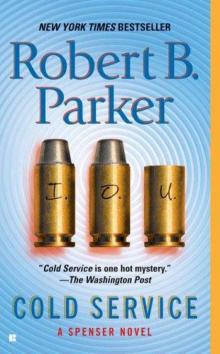 Cold Service s-32
Cold Service s-32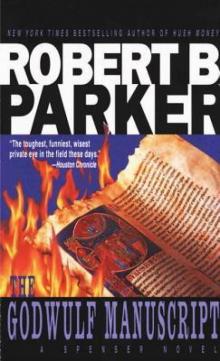 The Godwulf Manuscript
The Godwulf Manuscript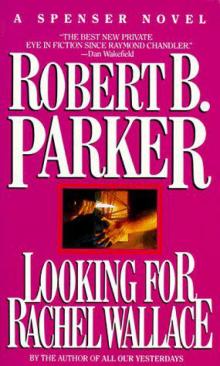 Looking for Rachel Wallace s-6
Looking for Rachel Wallace s-6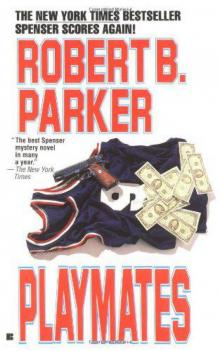 Playmates s-16
Playmates s-16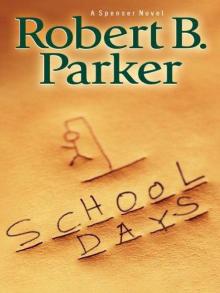 School Days s-33
School Days s-33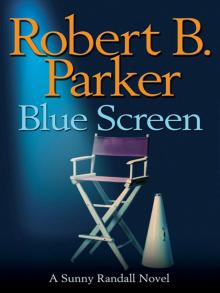 Blue Screen
Blue Screen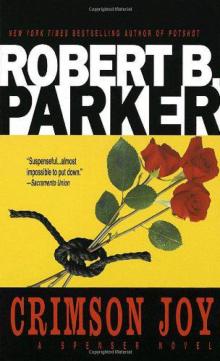 Crimson Joy
Crimson Joy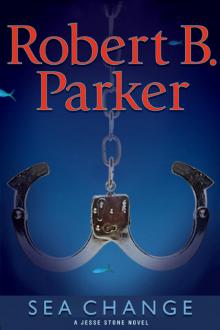 Sea Change js-5
Sea Change js-5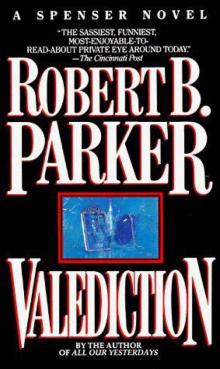 Valediction s-11
Valediction s-11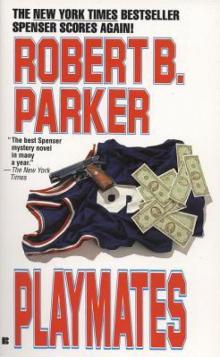 Playmates
Playmates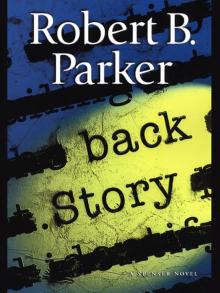 Back Story
Back Story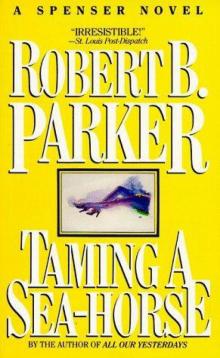 Taming a Sea Horse
Taming a Sea Horse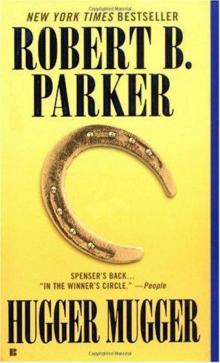 Hugger Mugger
Hugger Mugger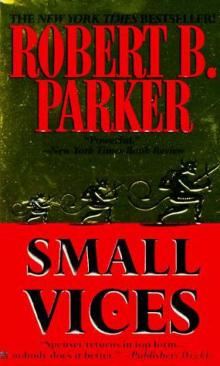 Small Vices s-24
Small Vices s-24 Silent Night: A Spenser Holiday Novel
Silent Night: A Spenser Holiday Novel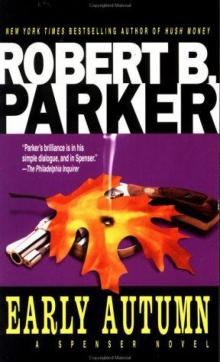 Early Autumn s-7
Early Autumn s-7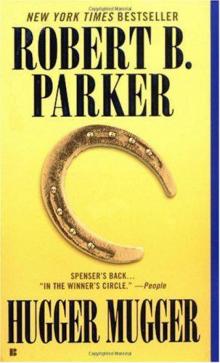 Hugger Mugger s-27
Hugger Mugger s-27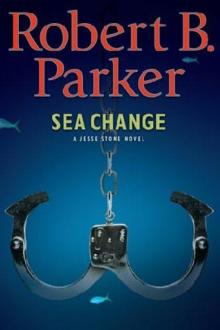 (5/10) Sea Change
(5/10) Sea Change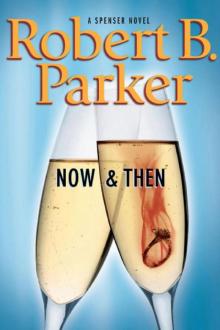 Now and Then
Now and Then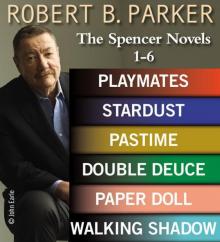 Robert B. Parker: The Spencer Novels 1?6
Robert B. Parker: The Spencer Novels 1?6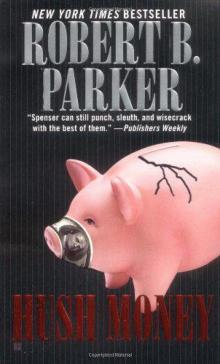 Hush Money s-26
Hush Money s-26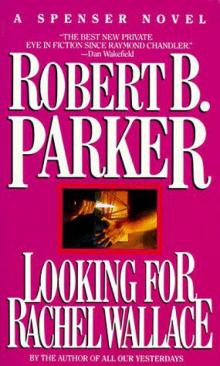 Looking for Rachel Wallace
Looking for Rachel Wallace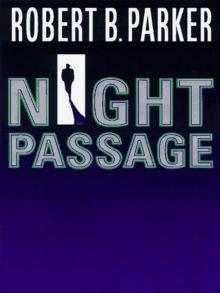 Night Passage
Night Passage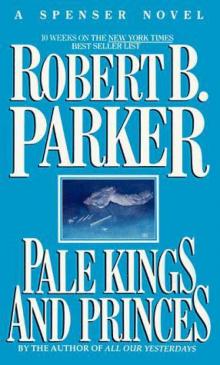 Pale Kings and Princes
Pale Kings and Princes All Our Yesterdays
All Our Yesterdays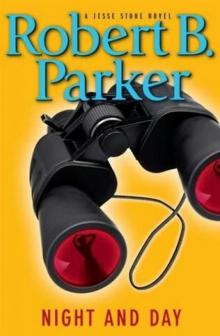 Night and Day js-8
Night and Day js-8 Stranger in Paradise js-7
Stranger in Paradise js-7 Double Play
Double Play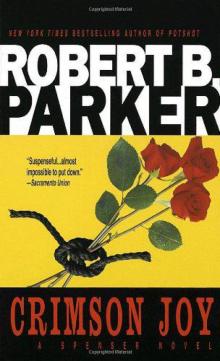 Crimson Joy s-15
Crimson Joy s-15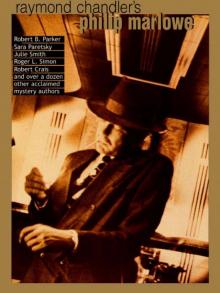 Raymond Chandler's Philip Marlowe
Raymond Chandler's Philip Marlowe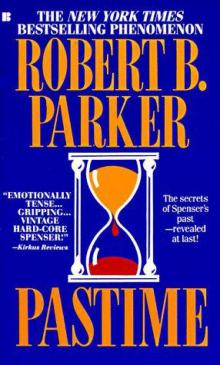 Pastime
Pastime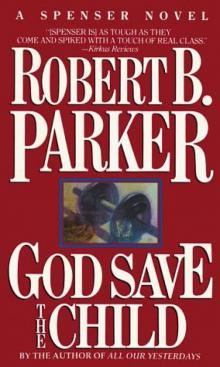 God Save the Child s-2
God Save the Child s-2 Bad Business
Bad Business Trouble in Paradise js-2
Trouble in Paradise js-2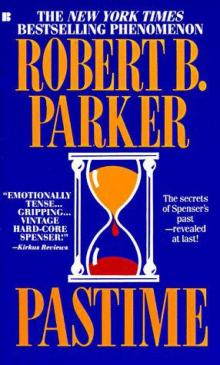 Pastime s-18
Pastime s-18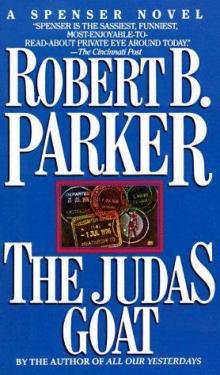 The Judas Goat s-5
The Judas Goat s-5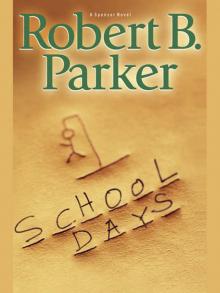 School Days
School Days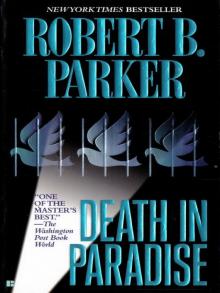 Death In Paradise
Death In Paradise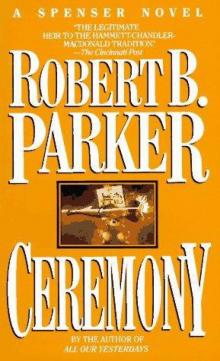 Ceremony
Ceremony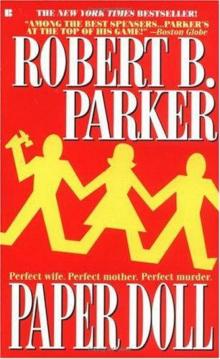 Paper Doll s-20
Paper Doll s-20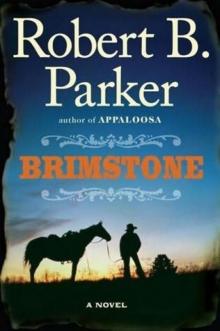 Brimstone vcaeh-3
Brimstone vcaeh-3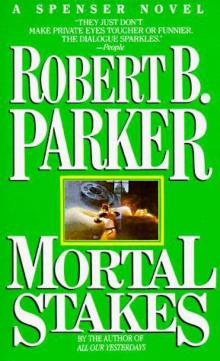 Mortal Stakes s-3
Mortal Stakes s-3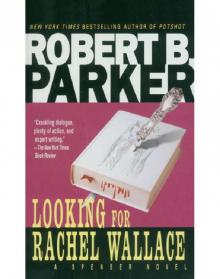 Spencer 06 - Looking for Rachel Wallace
Spencer 06 - Looking for Rachel Wallace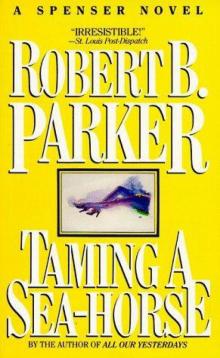 Taming a Sea Horse s-13
Taming a Sea Horse s-13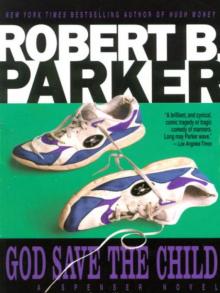 God Save the Child
God Save the Child Chance
Chance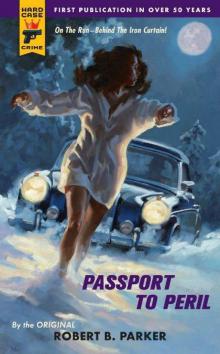 Passport To Peril hcc-57
Passport To Peril hcc-57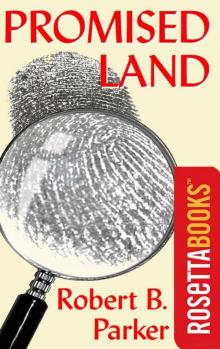 Promised Land
Promised Land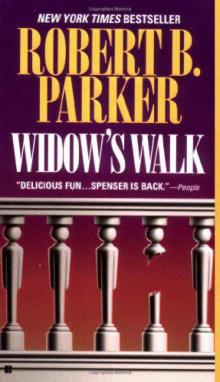 Widow’s Walk
Widow’s Walk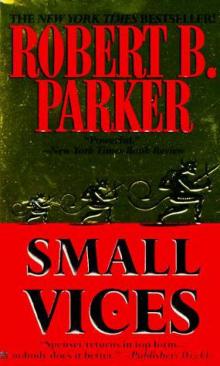 Small Vices
Small Vices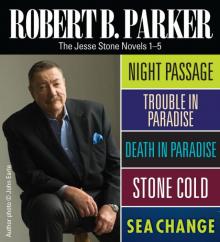 Robert B Parker: The Jesse Stone Novels 1-5
Robert B Parker: The Jesse Stone Novels 1-5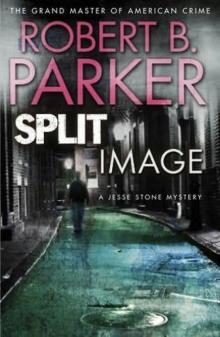 Split Image js-9
Split Image js-9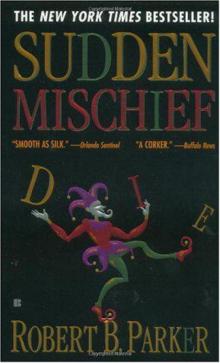 Sudden Mischief s-25
Sudden Mischief s-25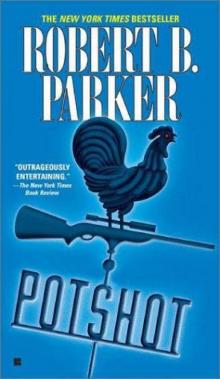 Potshot s-28
Potshot s-28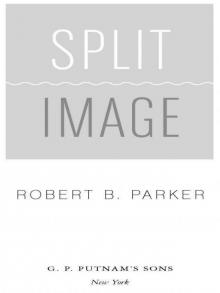 Split Image
Split Image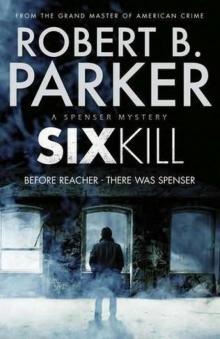 Sixkill s-40
Sixkill s-40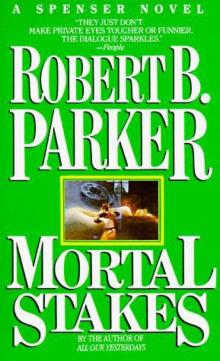 Mortal Stakes
Mortal Stakes Stardust
Stardust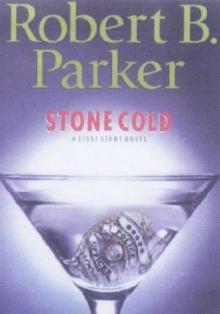 Stone Cold js-4
Stone Cold js-4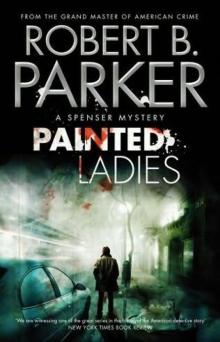 Painted Ladies s-39
Painted Ladies s-39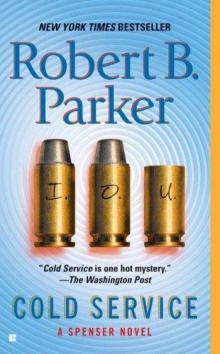 Cold Service
Cold Service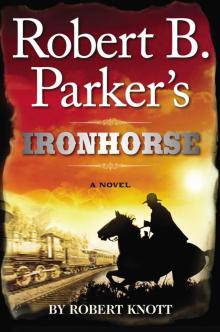 Ironhorse
Ironhorse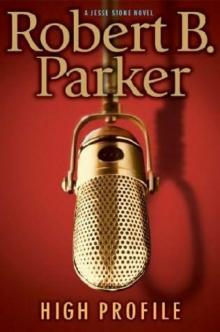 High Profile js-6
High Profile js-6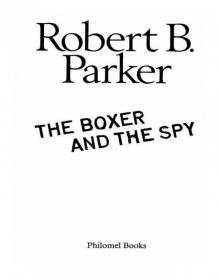 The Boxer and the Spy
The Boxer and the Spy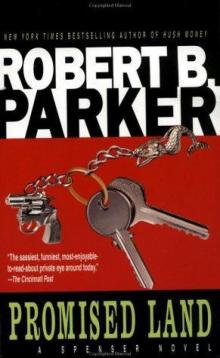 Promised Land s-4
Promised Land s-4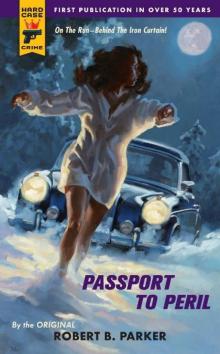 Passport to Peril (Hard Case Crime (Mass Market Paperback))
Passport to Peril (Hard Case Crime (Mass Market Paperback))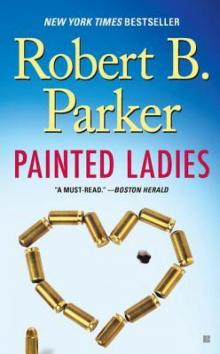 Painted Ladies
Painted Ladies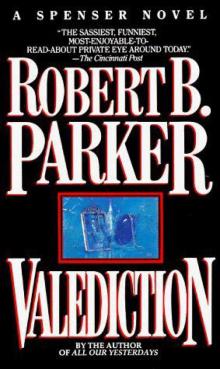 Valediction
Valediction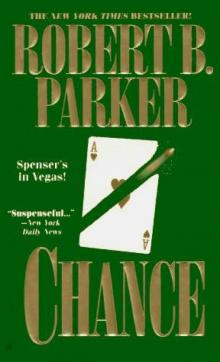 Chance s-23
Chance s-23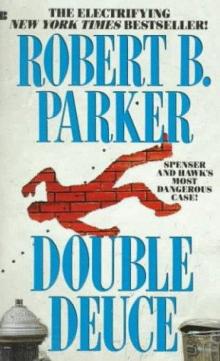 Double Deuce
Double Deuce Wilderness
Wilderness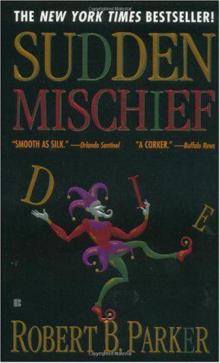 Sudden Mischief
Sudden Mischief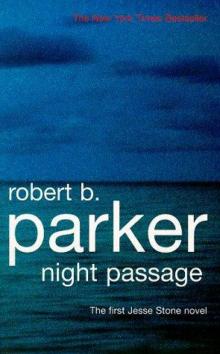 Night Passage js-1
Night Passage js-1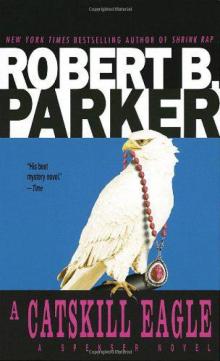 A Catskill Eagle
A Catskill Eagle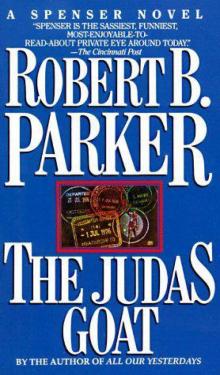 The Judas Goat
The Judas Goat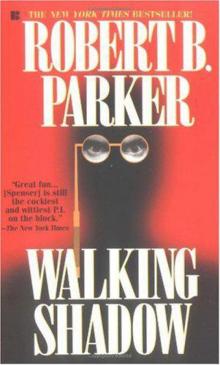 Walking Shadow
Walking Shadow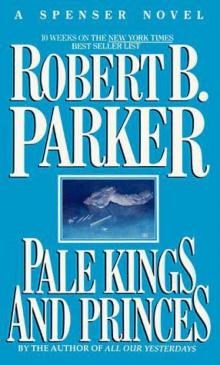 Pale Kings and Princes s-14
Pale Kings and Princes s-14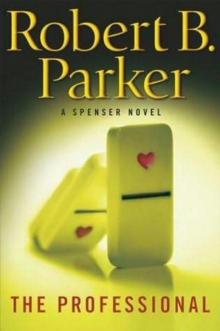 The Professional
The Professional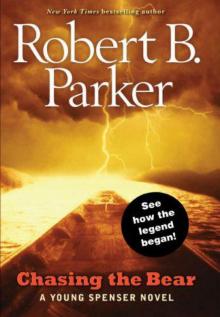 Chasing the Bear s-37
Chasing the Bear s-37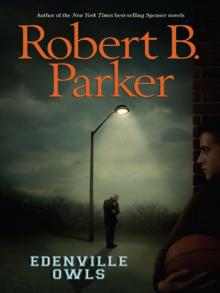 Edenville Owls
Edenville Owls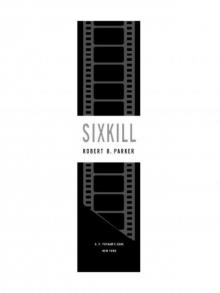 Sixkill
Sixkill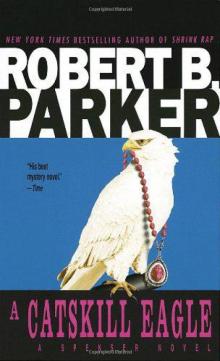 A Catskill Eagle s-12
A Catskill Eagle s-12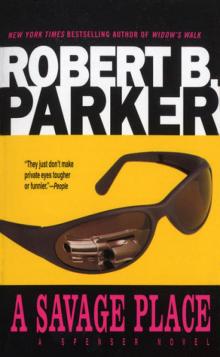 A Savage Place
A Savage Place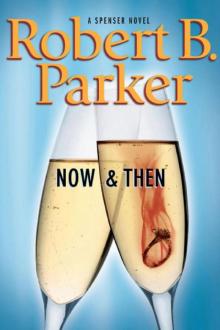 Now and Then s-35
Now and Then s-35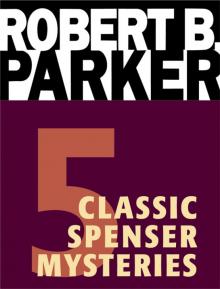 Five Classic Spenser Mysteries
Five Classic Spenser Mysteries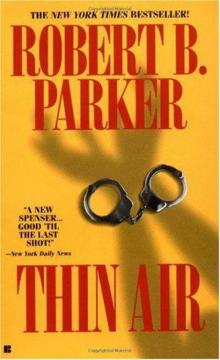 Thin Air s-22
Thin Air s-22